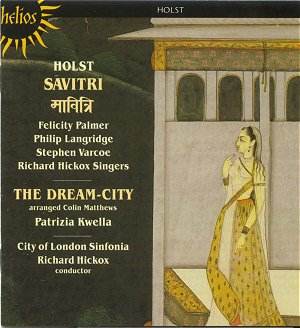Gustav HOLST (1874-1934)
Savitri (1908) 31.20
Dream City a song cycle (orch Colin Matthews) (1929)
26.30
 Felicity Palmer
(mezzo/Savitri)
Felicity Palmer
(mezzo/Savitri)
Philip Langridge (ten/Satyavan)
Stephen Varcoe (bar/Death)
Patrizia Kwella (sop) (in song cycle)
Richard Hickox Singers
City of London Sinfonia/Richard Hickox.
 HYPERION Helios CDH55042
[57.49]
HYPERION Helios CDH55042
[57.49]
Crotchet
Amazon
US

The bargain range catalogue is not what it was. It is so much better.
Rare Holst now joins the Naxos recording of the even rarer orchestral music.
Savitri is a chamber opera - typically intimate and in general approach the
very antithesis of 'good old Wagnerian bawling'. It is another legacy of
Holst's Sanskrit phase. The Orphean story of Love outwitting death and reclaiming
the deceased husband through guile is a common enough theme. Supported by
G. & I. Holst Ltd and the Holst Foundation this recording bears up well
against the ancient (1965) ARGO version in terms of pellucid clarity and
a most imaginatively conjured orchestral contribution. Vocally there are
drawbacks. Both Langridge and Varcoe suffer from a modicum of vibrato which
curbs an outright recommendation. Palmer and the choir however are ethereally
airborne in Welcome Lord and pace the occasional patch of squawl add
sheen to a lovely musical event. Aah! had Holst only lived until 1958 like
his great friend Vaughan Williams! In summary don't pass up any opportunity
to hear the Decca version but don't disdain this superb event. The Decca
is worth finding on 430 062-2LM. It features Janet Baker (mezzo); Robert
Tear (tenor); Thomas Hemsley (bass), Purcell Singers and English Chamber
Orchestra/Imogen Holst. This also offers Choral Hymns from the Rig Veda (III),
The Evening-watch, and the Seven Bridges Partsongs. Holst is not quite the
original he is claimed for in this work for the quiet stratospheres of
Rosenkavalier and even a little Wagnerian bombast are present if
fleetingly.
Humbert Wolfe (1885-1940), a much under-rated poet, was popular in the 1920s
and in the 1970s you could pick up most of his collections in second-hand
bookshops at ridiculously low prices. He is a sentimental writer and surely
his work touched chords with the generation of the bereaved who lived through
the post Great War period. Colin Matthews has drawn together these ten Holst
settings into a cycle. Holst never intended this but who are we to want to
complain when such riches are displayed for easy access. Kwella is extremely
good: strong and vulnerable. She sounds remarkably opulent in Persephone
in which Matthews clearly has Holst's Choral Symphony in mind.
In A Little Music one can imagine this song as a jumping off point
for Barber's Knoxville. Indeed these songs would well suit Dawn Upshaw's
voice. Those who know their Szymanowski or Czeslaw Marek orchestral songs
or Ravel's Sheherazade need not hesitate. Holst must surely have known
Warlock's Curlew to have written the bleakly and desolatingly tearful
Journey's End. The finale is Betelgeuse which can be thought
of as an analogue of Neptune in the planets. Its extraordinary text,
feeding the science fiction of the 1920s, is remote and chillingly lovely
- you need to look forward to Vaughan Williams' Vocalises (soprano
and clarinet) of 1958 or further forward still to Hovhaness's Saturn to find
again anything so starrily remote and fine.
The pause between the end of Savitri and start of the song cycle is
too short. Silence has its advantages.
Full texts and notes in the booklet.
A strong recommendation. Well worth your fiver. Compelling for the songs.
Reviewer
Rob Barnett

